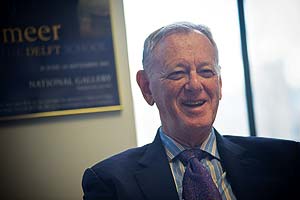Research
The Life of Louis Brandeis

By any measure, Louis Brandeis was a mountain of a man. One of the country’s preeminent lawyers, a reformer during the Progressive era, a leader of the Zionist movement and perhaps the most influential Supreme Court justice in history, Brandeis lived a life that profoundly impacts the world even today.
Capturing the true essence of a man as complex as Brandeis in a singular, definitive biography is not easy. Yet through diligent research and a thirst to understand the man and his work, Melvin Urofsky, a historian in residence at American University, deftly accomplishes that in his new book, Louis Brandeis: A Life.
“He demonstrates, deploying a Brandeisian array of factual material, why Brandeis still matters, nearly 70 years after his death,” famed attorney Alan Dershowitz wrote in a glowing review in the New York Times Book Review on Sept. 27. The Harvard professor declared the biography “monumental, authoritative, and appreciative.”
Satisfying words, undoubtedly, to Urofsky, who first delved into the world of Brandeis as a graduate student at Columbia University nearly a half-century ago.
“I had a potential dissertation topic involving him, but as it turned out there wasn’t enough material to support it,” he said. “But I got into his papers, and was fascinated by what I found.”
In 1965, Urofsky and a colleague won a prestigious three-year grant from the National Endowment for the Humanities to edit Brandeis’s letters. With the blessing of the jurist’s daughters and the University of Louisville Law School, where they were housed, he worked on what would become seven volumes of treasured text.
The publication of the letters led to a handful of Brandeis biographies in the ensuing years, but Urofsky’s is the first since the 1980s.
“I had a different take on him in terms of his having four intermeshed careers,” said Urofsky, a professor of law and public policy at Virginia Commonwealth University. “Yet the careers all intersect. One of his law clerks once told me that Brandeis had a ‘mind of one piece.’”
In the book, Urofsky explores Brandeis’s roots as the son of Czech-Jewish immigrants, his lucrative career as an attorney (in the late 1800s he made $50,000 a year—roughly equivalent to $900,000 today—when most lawyers were making less than $5,000), his championing of the state of Israel, and his career on the bench.
“Idealism often conjures up the image of nad’veté, of a romantic and impractical quixotism; none of these words apply to Brandeis,” Urofsky writes. “No one could have accomplished what he did in the legal profession, as a reformer, as a Zionist leader, and as a Supreme Court justice without being tough and realistic. He did not tilt at windmills nor see the world through rose-colored glasses. Rather, as he once told his daughter, he believed life to be hard.
“What set Louis Brandeis apart, what makes his life so interesting both then and now, is how he wedded this idealism to pragmatism.”
A prime example of this, Urofsky said, is Brandeis’s involvement in the Zionist movement.
“Zionism is an extremely idealistic movement,” he said. “Brandeis admitted he was drawn to it by the ideal of rebuilding a society based on the teachings of the prophets on justice and equality. When he goes over there though, he sees that before you can build anything here, you have to clear the swamps and get rid of malaria, that’s the pragmatic part.”
The book contains insights into Brandeis’s private life as well. He was a private man who destroyed much of his personal correspondence, however, Urofsky did receive from Brandeis’s granddaughter letters he wrote to his fiancée, Alice.
“He could be, to people who didn’t know him well, cold and austere,” Urofsky said. “He was an extremely efficient man who did not like to waste time. On the other hand, to people who knew him well, he was a good friend. He couldn’t tell a joke, but he liked jokes. He started laughing before he could tell the punch line.”
An athletic man, Brandeis canoed well into his 80s, and only gave up horseback riding when the influx of automobiles in Washington made the activity too dangerous.
“He took all of August off every year,” Urofsky said. “He once said he could do 12 months worth of work in 11, but not in 12.”
Wise words from a man who spoke many throughout his life. His dissent in Olmsted v. United States ultimately was adopted as a constitutional right to privacy, and his opinion in Whitney vs. California is hailed by many as the strongest defense of free speech in history.
“In his life and his work, he was always the idealistic pragmatist,” Urofsky writes in Brandeis, one of the Economist’s best books of 2009. “One whose faith in time remained great.”
